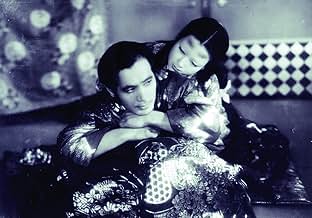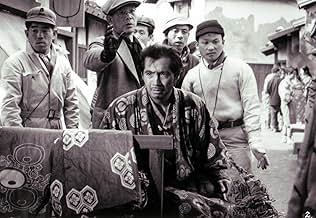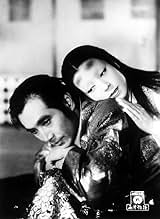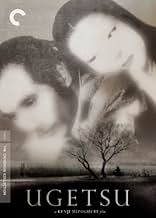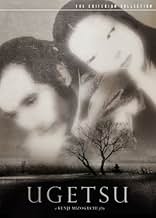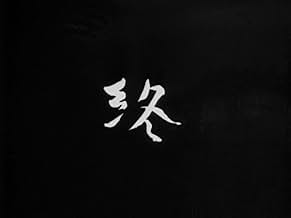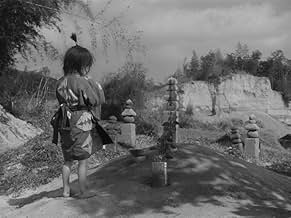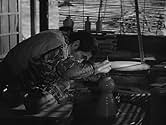IMDb RATING
8.1/10
27K
YOUR RATING
A tale of ambition, family, love, and war set in the midst of the Japanese Civil Wars of the sixteenth century.A tale of ambition, family, love, and war set in the midst of the Japanese Civil Wars of the sixteenth century.A tale of ambition, family, love, and war set in the midst of the Japanese Civil Wars of the sixteenth century.
- Nominated for 1 Oscar
- 6 wins & 2 nominations total
Eitarô Ozawa
- Tôbei
- (as Sakae Ozawa)
Featured reviews
10notmicro
This holds a special place in my heart, and I still consider it to be absolutely one of the very greatest films ever made for adults. The work of a mature artist, it resonates with Buddhist practice, and is a profoundly moving tale of the suffering of the human condition, the violence of war, the possibilities of art uplifting the spirit, the possibilities of redemption of character. The closing scene is one of such deeply-felt compassion and understanding that it is almost frightening; it prefigures in a way the stunning and more personal close of the subsequent Mizoguchi film "Sansho the Baliff".
On a lighter level, it is an amusingly sly allegory of the actual history of Japan for the 20 or so years prior to 1953, where in the end the women, embittered (or dead) as a result of their men's quixotic quest for military glory or war-profiteering, entreat them to give up their misguided and destructive dreams, settle down, and get back to their real responsibilities.
Which they did.
Originally available on LaserDisc.
On a lighter level, it is an amusingly sly allegory of the actual history of Japan for the 20 or so years prior to 1953, where in the end the women, embittered (or dead) as a result of their men's quixotic quest for military glory or war-profiteering, entreat them to give up their misguided and destructive dreams, settle down, and get back to their real responsibilities.
Which they did.
Originally available on LaserDisc.
In a time of unceasing turmoil, as sixteenth-century Japan is ravaged by marauding bands of warriors, the ambitious and hard-working potter, Genjuro, and his aspiring samurai brother, Tobei, risk a dangerous trip to the bustling city to sell their wares, seeking quick profit. The two 16th century Japanese peasants venture from their homes in pursuit of dreams, resulting in fateful consequences. As Tobei abandons his wife to buy a samurai outfit and seek fame and fortune, while Genjuro becomes involved with a ghost woman.
The classic film ambition, family, and war that established Migozuchi's reputation outside of Japan. A marvellous mix of drama, comedy, action and supernatural events with nifty camera movement . Based on two stories by the 18th century writer Akinara Ueda (often described as the japanese Guy de Maupassant), dealing with two peasants in pursuit of dreams and encounter little more than their own hapless folly and a bit of the supernatural. Gorgeous cinematography in black and white, inspired by nihonga (traditional Japanese painting) and woodblock prints. ¨Ugetsu¨ was one of a handful of Japanese films to sweep up awards at European festivals in the early 50s. Its reputation as one of Migozuchi's finest works and a landmark of the Japanese art cinema has remained undented ever since. The filmmaker's unique stablishment of atmosphere by means of long shot, long takes, sublimely graceful and unobtrusives camera movement, is everywhere evident in his treatment of the legend of a potter who leaves his family to market his wares during the ravages of a civil war, and is taken in and seduced by a ghost princess.
This ravishingly composed, evocatively made motion picture was competently directed by Kenji Migozuchi. He is said to be the first major feminist film-maker, his films frequently reveal women's positions in Japanese society, he includes long takes, often held for the duration of the scene. Migozuchi is cited Marcel L'Herbier, Josef von Sternberg, William Wyler and John Ford as his influence. Migozuchi is one of the rare directors who has helmed over 100 films, including the following: ¨Street of shame, Princess Yang Kwei Fei, Shin Heike Monogatari, The crucified lovers, Sansho the bailiff, A Geisha, Life of Oharu, Utamaro and his five women, Ronin part 1 and 2, The story of the late Chrysanthemum, Osaka elegy, and Sisters of the Gion¨. Rating Ugetsu: 7.5/10. Better than average, well worth watching. The film will appeal to Japanese classic fans.
The classic film ambition, family, and war that established Migozuchi's reputation outside of Japan. A marvellous mix of drama, comedy, action and supernatural events with nifty camera movement . Based on two stories by the 18th century writer Akinara Ueda (often described as the japanese Guy de Maupassant), dealing with two peasants in pursuit of dreams and encounter little more than their own hapless folly and a bit of the supernatural. Gorgeous cinematography in black and white, inspired by nihonga (traditional Japanese painting) and woodblock prints. ¨Ugetsu¨ was one of a handful of Japanese films to sweep up awards at European festivals in the early 50s. Its reputation as one of Migozuchi's finest works and a landmark of the Japanese art cinema has remained undented ever since. The filmmaker's unique stablishment of atmosphere by means of long shot, long takes, sublimely graceful and unobtrusives camera movement, is everywhere evident in his treatment of the legend of a potter who leaves his family to market his wares during the ravages of a civil war, and is taken in and seduced by a ghost princess.
This ravishingly composed, evocatively made motion picture was competently directed by Kenji Migozuchi. He is said to be the first major feminist film-maker, his films frequently reveal women's positions in Japanese society, he includes long takes, often held for the duration of the scene. Migozuchi is cited Marcel L'Herbier, Josef von Sternberg, William Wyler and John Ford as his influence. Migozuchi is one of the rare directors who has helmed over 100 films, including the following: ¨Street of shame, Princess Yang Kwei Fei, Shin Heike Monogatari, The crucified lovers, Sansho the bailiff, A Geisha, Life of Oharu, Utamaro and his five women, Ronin part 1 and 2, The story of the late Chrysanthemum, Osaka elegy, and Sisters of the Gion¨. Rating Ugetsu: 7.5/10. Better than average, well worth watching. The film will appeal to Japanese classic fans.
In Japan, due to its Buddhism and Shinto culture, the term Ghost is an description for evil of the spirits world. and the idea of spirits which dispatch from its physical body are describe as phamton. from the difference associate with these 2 terms we can understand that even in spirits there is description for the good and bad spirits. this is similar to the Chinese mythology for ghost. even if the spirits was wrongly accused, and coming back to human world for its revenge, this is still consider as an spirits rather than ghost, as it has its positive of motive and would not harm people who is not associate with his death. since spirits normally does not appear in the human world, and its appearance often associate with unfinished matter or grudge. which is the main characteristic for most of the Japanese film.
the most impressive Japanese ghost story is Ugetsu monogatari(1953), it was base on the novel with the same title. we can analysis the idea of Japanese ghost film via 2 aspect of the film.
Firstly, while Genjuro was selling pottery in the market, he was been order by Lady Wakasa and its nurse maid to send the good to their mansion personally, which was the starting point of ghostly love relationship.
By the hand of prestige cinema photographer, Kuzo Miyagawa, the mystic atmosphere, the trembling music of sanmise, the ghostly voice of men grudging, gives the mansion an appeal of a haunted mansion. The use of top view camera technique with the character Noh play like appeal,gives the scene much more mysterious, secluded, ghostly, euphoria aspect of the fantasy world. which above all explores the art of Japanese traditional beauty.although it is an black and white film, but Kuzo Miyagawa create an color of bewitch ghostly character on Lady Wakasa.
The very motive for the existence of Lady wakasa was to have a taste of love, as she was kill before she can understand what love is, after resurrect by the nursemaid, she have become and spirits that looking for the ideal man to love. that is why she put a spell on Genjuro. to love not to hurt.
The second aspect for Genjuro associate with spirits was at the end part of the movie, while He push open the cripple door of his home, he saw an empty house, yet after the camera return an image of the room, Miyagi, Genjuro's wife appear, who was setting beside the stove alone tailoring clothes, and waiting for his husband to eat and change into comfy kimono, Genjuro feel extremely tire after all the events therefore he quickly falls asleep, next morning, when the villager master realize he is return went into his home and explain the tragic of her wife. and the disappearance of his son, coincidentally, his son returns in the very moment.
The movie finish with a long shot as the kid playing beside his mothers grave while Genjuro praying, which symbolize Miyagi has finally saw the father and son reunited and now he is able to rest in peace, and fly to heaven.
The movie demonstrate the childish, stubbornness and foolishness of male. yet it purify the females character as loving and sincere, which demonstrate no scary or horrifying intention to the viewer when associate with ghost. infect we associate with the idea of gentleness, shyness of its character. the eternal serenity towards the love one can only be associate with ghostly figure in a time transcend world.
the most impressive Japanese ghost story is Ugetsu monogatari(1953), it was base on the novel with the same title. we can analysis the idea of Japanese ghost film via 2 aspect of the film.
Firstly, while Genjuro was selling pottery in the market, he was been order by Lady Wakasa and its nurse maid to send the good to their mansion personally, which was the starting point of ghostly love relationship.
By the hand of prestige cinema photographer, Kuzo Miyagawa, the mystic atmosphere, the trembling music of sanmise, the ghostly voice of men grudging, gives the mansion an appeal of a haunted mansion. The use of top view camera technique with the character Noh play like appeal,gives the scene much more mysterious, secluded, ghostly, euphoria aspect of the fantasy world. which above all explores the art of Japanese traditional beauty.although it is an black and white film, but Kuzo Miyagawa create an color of bewitch ghostly character on Lady Wakasa.
The very motive for the existence of Lady wakasa was to have a taste of love, as she was kill before she can understand what love is, after resurrect by the nursemaid, she have become and spirits that looking for the ideal man to love. that is why she put a spell on Genjuro. to love not to hurt.
The second aspect for Genjuro associate with spirits was at the end part of the movie, while He push open the cripple door of his home, he saw an empty house, yet after the camera return an image of the room, Miyagi, Genjuro's wife appear, who was setting beside the stove alone tailoring clothes, and waiting for his husband to eat and change into comfy kimono, Genjuro feel extremely tire after all the events therefore he quickly falls asleep, next morning, when the villager master realize he is return went into his home and explain the tragic of her wife. and the disappearance of his son, coincidentally, his son returns in the very moment.
The movie finish with a long shot as the kid playing beside his mothers grave while Genjuro praying, which symbolize Miyagi has finally saw the father and son reunited and now he is able to rest in peace, and fly to heaven.
The movie demonstrate the childish, stubbornness and foolishness of male. yet it purify the females character as loving and sincere, which demonstrate no scary or horrifying intention to the viewer when associate with ghost. infect we associate with the idea of gentleness, shyness of its character. the eternal serenity towards the love one can only be associate with ghostly figure in a time transcend world.
'Ugetsu' is a Japanese film directed by Kenji Mizoguchi based on stories in Ueda Akinari's book titled Ugetsu Monogatari. At the basic level, this is a story about survival during the Japanese Civil Wars in the late 16th century. The film follows two married couples namely Genjurō and Miyagi, Tōbei and Ohama of the Ōmi Province. They get uprooted along with a lot of other families when their village gets attacked by Shibata Katsuie's army. Genjurō being a potter decides to go to Ōmizo to sell his wares to earn money. He goes to Ōmizo with Tōbei and Ohama while Miyagi decides to stay back and take care of Genichi(Miyagi and Genjurō's son). While in Ōmizo, Genjurō gets attracted to the mysterious and enigmatic Lady Wakasa and becomes overwhelmed by his interest in her, and Tōbei, who was always a bit of a delusional dimwit, gets more and more inclined towards living the life of a samurai and show-off his bravery and strength. Tōbei ends up seeking out Samurai soldiers leaving his wife Ohama alone and helpless during chaotic wartime.
Along with 'Rashomon', 'Ugetsu' is considered by many critics to be the film that opened doors for Japanese cinema in the western world and gave the cinema in Japan a global exposure. Like 'Rashomon', this film was also based on Japanese folk tales, but Mizoguchi's humanist filmmaking made it relevant for the 1950s and its relevance hasn't waned at all in the last 50 years. 'Ugetsu' belonged to a whole line of films that got released after WWII along with 'Rashomon', 'The Bicycle Thief', 'The Planes are Flying', 'Ivan's Childhood', etc. which looked at war in a critical way instead of glorifying. They critiqued the very purpose of war by brutally depicting its devastating consequences. Although 'Ugetsu' is set in 16th century Japan during the Japanese Civil War, for me it clearly is an allegory for Japanese society during WWII and the allegory here is a lit bit more overt and obvious than the same in 'Rashomon'.
This can surely be seen as a feminist film. We see the men fall prey to puerile ambitions and greed, while the women are left helpless and asked to fend for themselves during a time of war when they are more prone to danger and harm with ravenous and wild warriors running around everywhere. But the women in the film do what they have to do without showing any fear and without accepting defeat. After watching this film, I don't think it is possible for anyone to not fall completely in love with the character of Miyagi. She has unconditional love for her husband Genjurō and their son Genichi. She does whatever she has to, to make sure her son survives under difficult, harsh conditions, when Genjurō was spending time with Lady Wasaka. This film shows the hopeless nature of gender inequality that existed in medieval Japan and how women were extremely vulnerable.
The film as I mentioned before is an allegory for the Japanese society and the Japanese political system in the WWII era. Like Tōbei, some men are too drawn to the idea of power and will go to any lengths to prove to others that they are powerful by engaging in pointless fights. Genjurō represents those people who being led by unrestricted greed want to utilise war in their own way by making use of people's troubles to fill up their pockets. Lady Wasaka is very mysterious and interesting character. She is a very Mephistopheles- like character who lures Genjurō into her world by promising him eternal happiness, wealth and love. The Faust-esque Genjurō falls for her and abandons his own family. If the people sitting on thrones are led by the greed for power and the greed for lust and wealth, it can sometimes lead to irreparable damage to their country and its people. This might sound preachy, but the film presents this through the screenplay instead of blatant sermons. The film is also a commentary on the disappearance of Buddhist ideals and principals in modern Japanese society.
Along with Mizoguchi's style of storytelling, one can't help but admire the skill of his camera work. The film has many beautiful wide shots which serve both purposes - beauty as well as thematic relevance. There are some seamless transitions from one scene to another. Mizoguchi also beautifully builds tension and sets a Gothic creepy atmosphere in certain scenes which lends the film a genuine horror element. However, 'Ugetsu' like 'Rashomon' ends in a very optimistic and emotional note.
'Ugetsu' is a film whose importance and significance in film history can never be questioned. It is an artistic allegory of life during wartime. As long as the concept of war exists in human society, this film will continue to have significant relevance.
Along with 'Rashomon', 'Ugetsu' is considered by many critics to be the film that opened doors for Japanese cinema in the western world and gave the cinema in Japan a global exposure. Like 'Rashomon', this film was also based on Japanese folk tales, but Mizoguchi's humanist filmmaking made it relevant for the 1950s and its relevance hasn't waned at all in the last 50 years. 'Ugetsu' belonged to a whole line of films that got released after WWII along with 'Rashomon', 'The Bicycle Thief', 'The Planes are Flying', 'Ivan's Childhood', etc. which looked at war in a critical way instead of glorifying. They critiqued the very purpose of war by brutally depicting its devastating consequences. Although 'Ugetsu' is set in 16th century Japan during the Japanese Civil War, for me it clearly is an allegory for Japanese society during WWII and the allegory here is a lit bit more overt and obvious than the same in 'Rashomon'.
This can surely be seen as a feminist film. We see the men fall prey to puerile ambitions and greed, while the women are left helpless and asked to fend for themselves during a time of war when they are more prone to danger and harm with ravenous and wild warriors running around everywhere. But the women in the film do what they have to do without showing any fear and without accepting defeat. After watching this film, I don't think it is possible for anyone to not fall completely in love with the character of Miyagi. She has unconditional love for her husband Genjurō and their son Genichi. She does whatever she has to, to make sure her son survives under difficult, harsh conditions, when Genjurō was spending time with Lady Wasaka. This film shows the hopeless nature of gender inequality that existed in medieval Japan and how women were extremely vulnerable.
The film as I mentioned before is an allegory for the Japanese society and the Japanese political system in the WWII era. Like Tōbei, some men are too drawn to the idea of power and will go to any lengths to prove to others that they are powerful by engaging in pointless fights. Genjurō represents those people who being led by unrestricted greed want to utilise war in their own way by making use of people's troubles to fill up their pockets. Lady Wasaka is very mysterious and interesting character. She is a very Mephistopheles- like character who lures Genjurō into her world by promising him eternal happiness, wealth and love. The Faust-esque Genjurō falls for her and abandons his own family. If the people sitting on thrones are led by the greed for power and the greed for lust and wealth, it can sometimes lead to irreparable damage to their country and its people. This might sound preachy, but the film presents this through the screenplay instead of blatant sermons. The film is also a commentary on the disappearance of Buddhist ideals and principals in modern Japanese society.
Along with Mizoguchi's style of storytelling, one can't help but admire the skill of his camera work. The film has many beautiful wide shots which serve both purposes - beauty as well as thematic relevance. There are some seamless transitions from one scene to another. Mizoguchi also beautifully builds tension and sets a Gothic creepy atmosphere in certain scenes which lends the film a genuine horror element. However, 'Ugetsu' like 'Rashomon' ends in a very optimistic and emotional note.
'Ugetsu' is a film whose importance and significance in film history can never be questioned. It is an artistic allegory of life during wartime. As long as the concept of war exists in human society, this film will continue to have significant relevance.
The movie starts out pretty uncomfortably, two peasants in 16th century Japan who dream of richness and glory so blindly, they can't even hear the pretty straight-forward protests of their loving wives who try to convince them that their happiness is fine at home. When one, a pottery smith, makes a small bundle selling his wares, they decide to make a much larger batch together and become rich.
Forced out of their homes by an approaching war and uncertain where to go, they take their wares to a thriving market place, where the second peasant's ambition to be a samurai divides them and causes all four characters, the two peasants and their wives, to be separated, all fending for themselves amongst the war and various classes differently.
At this point the film reverses itself and instead of being a pretty skin-deep, tragic bud of greed, it blooms into a beautiful and haunting tale of obsession and illusion. The two main stories of the peasants and their wives are opposite only in their imaged realism, where one peasant falls completely under the curse of an enchanting ghost and the other lies and steals his way to fame, only both of them are eventually knocked down from their own hubris and forced to finally awaken to what their wives have said all along.
It's quite exquisite, this movie, with its long takes and its lack of the usual constructs that make up messages of obsession and greed. Once it gets beyond the small, uncomfortable, claustrophobic world of the peasant's home, it becomes audaciously challenging and mysterious, so that the same small home becomes amazingly wonderful and comforting. The very essence of the movie is breathed into the emotions of the audience in very subtle ways, making a very unforgettable cinematic experience.
--PolarisDiB
Forced out of their homes by an approaching war and uncertain where to go, they take their wares to a thriving market place, where the second peasant's ambition to be a samurai divides them and causes all four characters, the two peasants and their wives, to be separated, all fending for themselves amongst the war and various classes differently.
At this point the film reverses itself and instead of being a pretty skin-deep, tragic bud of greed, it blooms into a beautiful and haunting tale of obsession and illusion. The two main stories of the peasants and their wives are opposite only in their imaged realism, where one peasant falls completely under the curse of an enchanting ghost and the other lies and steals his way to fame, only both of them are eventually knocked down from their own hubris and forced to finally awaken to what their wives have said all along.
It's quite exquisite, this movie, with its long takes and its lack of the usual constructs that make up messages of obsession and greed. Once it gets beyond the small, uncomfortable, claustrophobic world of the peasant's home, it becomes audaciously challenging and mysterious, so that the same small home becomes amazingly wonderful and comforting. The very essence of the movie is breathed into the emotions of the audience in very subtle ways, making a very unforgettable cinematic experience.
--PolarisDiB
Did you know
- TriviaThe plot is a combination of two tales from the work of Ueda Akinari called "Tales of moon and rain".
- GoofsAfter the soldier cuts off the general's head there's no blood on his sword.
- ConnectionsFeatured in De l'origine du XXIe siècle (2000)
- How long is Ugetsu?Powered by Alexa
Details
Box office
- Gross US & Canada
- $11,197
- Opening weekend US & Canada
- $6,154
- Mar 5, 2017
- Gross worldwide
- $24,959
- Runtime1 hour 36 minutes
- Color
- Aspect ratio
- 1.37 : 1
Contribute to this page
Suggest an edit or add missing content

Top Gap
By what name was Les Contes de la lune vague après la pluie (1953) officially released in India in English?
Answer

